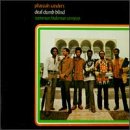| All Artists: Pharoah Sanders Title: Summun Bukmun Umyun (Deaf Dumb Blind) Members Wishing: 1 Total Copies: 0 Label: Grp Records Release Date: 10/6/1998 Genres: Jazz, Pop Styles: Avant Garde & Free Jazz, Modern Postbebop, Bebop Number of Discs: 1 SwapaCD Credits: 1 UPCs: 011105026529, 0011105126526, 011105126526 |
Search - Pharoah Sanders :: Summun Bukmun Umyun (Deaf Dumb Blind)
 | Pharoah Sanders Summun Bukmun Umyun (Deaf Dumb Blind) Genres: Jazz, Pop
|
Larger Image |
CD Details |
CD ReviewsMaybe the Best Impulse Album Christopher Forbes | Brooklyn,, NY | 10/17/2002 (5 out of 5 stars) "It's hard to rate Pharoah's Impulse albums. They are all supreme examples of spiritual depth in music. But Deaf, Dumb and Blind may be the greatest in my opinion...perhaps even better than the superb Karma, and that's saying alot. First of all, the percussion groove on this album really kicks! Sometimes, both on Karma and on Jewels of Thought, the percussion sounds more like a collection of colors, rather than a propelling force. On this CD the percussion is out front, and deeply African in spirit. Propelled by marvelous conga playing from Anthony Wiles and African percussion from Nathaniel Bettis, great trap work by Clifford Jarvis, along with the rest of the ensemble on small percussion, the pieces really cook. Second, the horn section is stellar; Woody Shaw and Gary Bartz. Third, you have the first large scale appearance of Pharoah on soprano, which is every bit as beautiful as his tenor playing. Fourth, (and this may not pertain to everyone) there's no yodelling, or at least very little. I actually like Leon Thomas' contributions to Karma and Jewels, but I know that it puts many people off. This album is all instrumental. Both cuts on the album are stellar. Summun, Bukmun, Umyun (Deaf, Dumb and Blind) is one of Pharoah's long two chord jams. With the wonderful percussion behind it, the track is both tied to the earth and wandering in the heavens all at once. The second track, Let Us Go Into the House of the Lord is a sublime, out of tempo modal chant. It moves me to tears. In their time, Pharoah's Impulse albums never got the credit they deserved. Critics either dismissed him as just revamping old Coltrane ideas, or as too involved with the 60s rock ethos. Conservatives felt he was too free and had no traditional chops, and the progressives felt that the unrestrained modalisms of the albums represented a betrayal of the avant-garde energy school and a step back from Pharoah's ground breaking work with Trane. Both sides got Pharoah all wrong. Pharoah was trying to speak peace in a world that just didn't want to hear it...and that meant following his muse, no matter where it led him. It still does mean that for Pharoah, and he still leaves fans confused. Those who want him to retain his fire from the Trane period are disappointed with the ballad albums and the Bill Laswell produced things. Those who want a more mellow Pharoah are shocked by the fire of albums like Spirit. The true mark of Pharoah's genius is that he goes his own way always, no matter what anyone else says. So snap up this album soon. Word is that the company who owns the Impulse catalogue is thinking of discontinuing the series again, so who knows when you may have the chance again. Work this beautiful needs to be heard." A fabulous addition to a Pharoah collection macfawlty | potomac, MD USA | 08/21/2000 (5 out of 5 stars) "I have had this one on LP and I just got it signed by Pharoah last night at Blues Alley along with Village of the Pharoahs and Live at the East. This is beautiful and spiritual extending the jazz spirituality begun with Trane. You also must have Karma, and two under Alice Coltrane, Journey in satchadanda, and Ptah, the El Daoud. BTW, his first song at the show last night was My favorite Things... it was an hour long journey that left me shaking I was so emotionally drained." Affirmation of the African Roots nadav haber | jerusalem Israel | 02/25/2002 (5 out of 5 stars) "This CD, made in 1970 by Sanders and a fantastic group of musicians, is one of the best attempts I know by African American musicians to experience with African rhythms and sounds.The first track, Deaf Dumb and Blind (with the Arabic translation) starts off with deep African drumming and rhythmic playing. There is barely any trace of "the Louis Armstrong" heritage - it goes all the way back to African tribal drumming. When Sanders' saxophone comes in - it reminds me of an elephant's scream, or a lion's roar. This should not be new to anyone who heard Sanders before.
What is outstanding about this performance is its oneness, the fact that it does not force itself but takes you along on the African spiritual journey. The musicians are all great - including Woody Shaw on trumpet, Gary Bartz on saxophone, and Sonny Liston Smith on keyboards. The overall effect is amazing even in Sanders' usual high standards. This is creative music, timeless and provocative. The second track is more abstract. It seems like one constant sound flowing, sweeping and subtly changing. It is beautiful in the fullest sense of the word. This music is just so deep... I cant think of anyone who should not listen to it. Sadly, it has never caught the attention it deserves and remains the almost secret pleasure of lucky few." |

 Track Listings (2) - Disc #1
Track Listings (2) - Disc #1